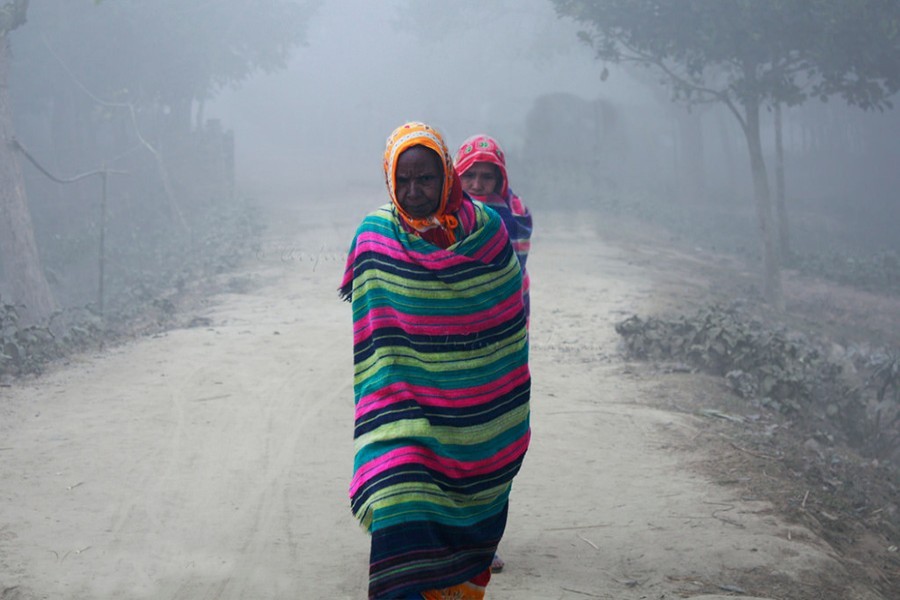Bangladesh is not a severely cold-prone country. People are habituated with a moderate winter here when the average temperature remains between 13°C and 20°C. But when cold wave sweeps the country, especially during December-January period, mercury goes down to single digit causing huge suffering for people from all walks of life.
At present, a mild to moderate cold wave is sweeping over some parts of the country with the plummeting of temperature to as low as 2.6 degrees Celsius.
Biting wintry weather is disrupting normal life. Thousands of people suffer miserably because of the chilling wind and mist blowing over the country, particularly in the northern part. The cold weather makes it difficult for people, especially for the day labourers to find work.
The cold wave, combined with dense fog, affects boro seedlings adversely, leaving farmers to suffer badly. Ferry services in some routes have been suspended due to dense fog.
The poor people, particularly those who live below the poverty line in vulnerable areas, are the worst sufferers, as they lack warm clothes. Many people, especially children and elderly men, are affected with various cold-related diseases.
Crops especially potato, wheat, mastered, boro seedlings and vegetables are vulnerable to long-lasting cold wave.
Due to their inability to buy warm clothes, many distressed people try to fight the bone-chilling cold with the heat of burning straws, leaves and old rubber tyres. The vulnerable people living in the chars and haors have been suffering seriously for the last few days.
The Ministry of Disaster Management and Relief, political parties, humanitarian organisations, NGOs, social organisations, banks and well off individuals distribute warm clothes and blankets among poor people in different parts of the country to reduce their sufferings. However, such kind of assistance is found inadequate and temporary. Special care should be taken for aged people, mainly for asthma patients and children aged below 5 years. New-born babies need special and appropriate care.
To protect Boro seed-beds, following measures should be taken: 1) Covering the seed-bed with polythene sheets; 2) Shedding dew drops from seeds by pulling a rope; 3) Pouring water into the affected seed-beds in the afternoon and removing the water in the morning; 4) Spraying proper quantity of appropriate medicine to destroy fungus; 5) Replacing affected plants with new ones, if possible; 6) Consulting local agriculture officials.
A cold wave can turn into a disaster, so concerned authorities and organisations should devise a special preparedness programme to fight it. Cold waves may become a common phenomenon in the coming days, particularly in winter season.
Long-term initiatives are needed to reduce the cold wave vulnerability of the poor so that they can improve their livelihoods, increase their income for making better houses and can buy blankets and warm clothes. They should be provided with soft loan for buying winter clothes and medicines.
A special safety net programme for the affected people, particularly in the most vulnerable areas, should be taken by relevant authorities and organisations.
Inclusion of winter-affected communities with proper vulnerability and capacity analysis in the development programmes of the government and other agencies can be a sustainable step for improving their wintry resiliency.
An integrated approach, instead of isolated move like blanket distribution, is crucial in this regard.
The writer is an expert in disaster risk reduction and climate change adaptation, and a development Lawyer. [email protected]


